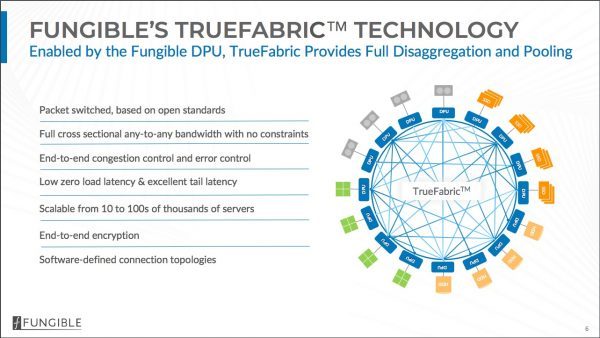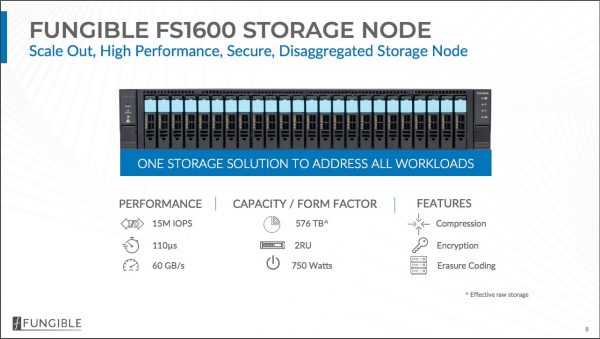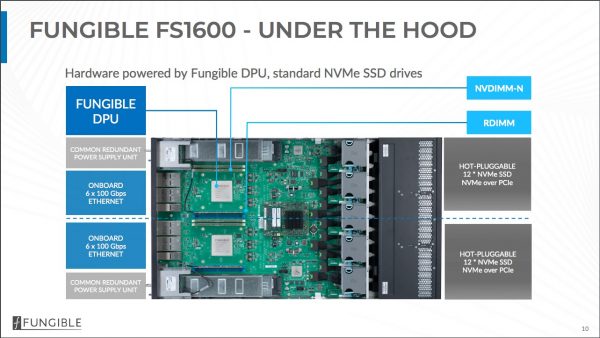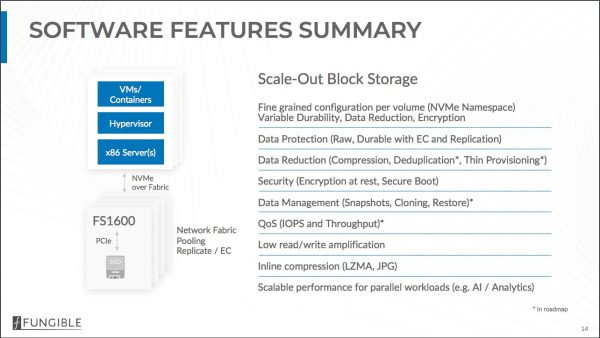Fungible Unveils “World’s Fastest” NVMe Disaggregated Storage Platform
Storage Cluster delivers 300 million IO/s in data center rack, scalable to many racks.
By Philippe Nicolas | October 27, 2020 at 2:18 pmFungible Inc. unveiled its first line of data-centric platforms, the Storage Cluster.
Powered by the Fungible Data Processing Unit (DPU), the Storage Cluster is a high performance, secure, scale-out, disaggregated data storage platform, delivering 15 million IO/s in a 2RU form factor, scaling linearly to 300 million IO/s in a single 40RU rack, and extending further to many racks. These performances enable workloads to be consolidated, increasing utilization of storage media, and improving footprint and $/IO/s by at least 3x compared to existing software-defined storage solutions.
“Today, we demonstrate how the breakthrough value of the Fungible DPU is realized in a storage product,” said Pradeep Sindhu, CEO and co-Founder. “The Fungible Storage Cluster is not only the fastest storage platform in the market today, it is also the most cost-effective, reliable, secure and easy to use. This is truly a significant milestone on our journey to realize the vision of Fungible Data Centers – where compute and storage resources are hyper-disaggregated and then composed on-demand to dynamically serve application requirements.”
“As enterprises move towards more data-driven business models, they will look to modernized IT infrastructure to deliver performance at scale for analytics workloads and the agility to rapidly adapt to evolving market conditions,” said Eric Burgener, research VP, infrastructure systems, platforms and technologies group, IDC. “Powered by the innovative new Fungible Data Processing Unit, Fungible’s new Storage Cluster delivers eye-popping throughput of hundreds of millions of IO/s with a composable, software-defined architecture that enables on-the-fly adaptability to meet the dynamically changing requirements of the new digital era.”
“Innovations in data center infrastructure have occurred largely within the silos of compute, storage and networking,” said Raj Yavatkar, CTO, Juniper Networks, Inc. “Fungible has broken down these silos delivering end-to-end value with Fungible DPU enabled servers interconnected by TrueFabric, a truly ground-breaking networking technology, and software composable for on-demand provisioning. This approach will serve as a blueprint for future data centers from core to edge.”
“We have been able to establish compelling value and broad applicability of the Fungible Storage Cluster in use cases such as distributed file systems, high-performance scale-out databases, IaaS deployments and many other areas,” added Sindhu. “We look forward to seeing the industry leverage its step-function advancements in capabilities to accelerate innovations in ultra-intelligent applications of the future.”
The Storage Cluster has been validated with IBM Spectrum Scale, delivering more than 80 million read IO/s/PB. “We are excited about the expansion of the Spectrum Scale ecosystem with Fungible and the joint validation we have completed,” said Bina Hallman, VP of strategy, IBM Storage.
“With the continuous advancements in NVMe SSD media and protocols, the time is ripe to capitalize on the benefits of disaggregated storage,” said Ashok Ganesan, chief product officer, Stackpath, LLC. “The Fungible Storage Cluster comes at an opportune time to serve an industry clamoring not just to maximize performance, but to turn performance density into much better footprint and cost efficiencies.”
The Storage Cluster comprises a cluster of Fungible FS1600 storage target nodes connected over a standards-based IP network and the Fungible Composer software. The FS1600s implement the data path for storage while the Fungible Composer performs control and management functions. This clean separation of functions results in higher performance, better scalability and reliability.
Each FS1600 storage target node is powered by 2 Fungible F1 DPUs and packs 24 standard NVMe SSDs delivering an aggregate of 15 million IO/s in a 2RU form factor. This represents more than 5x performance improvement over traditional x86-based storage controller solutions. It also enables storage data services, such as data durability, data reduction, data security concurrently, in-line and at-line rate. While the FS1600 natively supports NVMe-over-TCP, it also supports NVMe-over-TrueFabric. The use of TrueFabric between the FS1600 storage target and host-side Fungible DPU offers additional benefits: specifically, built-in security, improved end-to-end performance and linear scalability to thousands of nodes.
The Fungible Composer is a centralized software solution developed to configure, manage, orchestrate, control and deploy a cluster of disaggregated FS1600 storage nodes. It comprises 5 services: a storage service, a network management service, a telemetry service, a node management service responsible for log collection, and an API gateway that provides external access to the services provided by the Fungible Composer.
“At Tech Data, our goal is to bring compelling technology solutions and value to end customers through our massive network of channel partners,” said Sergio Farache, EVP of strategy, innovation, cloud and M&A, Tech Data Corp. “The Fungible Storage Cluster represents the type of high-value technology that will energize the channel, supporting end-customers with extremely stringent performance and efficiency requirements.”
“Today’s technology leaders are continuously challenged to drive efficiencies, optimize for lean deployments, maximize hardware investments, yet be adequately agile to keep up with the dynamic rate of change of modern workloads,” said Jay Chappell, senior director of platform architecture, Trace3, Inc. “Fungible has addressed this market in a very innovative way with their disaggregated technology. The high-performance Fungible Storage Cluster enables next-gen workloads to solve today’s demands solidifying the path for what is coming next.”
The Storage Cluster is available.
Comments
Finally Fungible lands on the planet with an interesting value proposition. Externally the storage array looks similar to others but internally several new elements invite us to dig more.
Fungible is the conceptor, designer and developer of a new processor named DPU (Data Processing Unit) that offloads and boosts data oriented tasks, heavy ones, to offer a new level of services and potentially replace CPUs.
This new approach targets intensive data centers with lots of data traffic and processing demands. DPU is finally the third socket with CPU and GPU positioned for next gen compute, network, storage, security and analytics. The company vision and soon a reality is to offer an open network named TrueFabric between compute resources and storage entities by decoupling these 2 layers. The team developed 2 flavors, the F1 DPU for storage targets and the S1 DPU for server side.

Waiting TrueFabric as a mature comprehensive and ready network, the first phase is represented by the FS1600 block storage array using NVMe-over-TCP (NVMe-oF 1.4) and TrueFabric, Fungible's network.
As mentioned above, this storage unit is a 2RU equipped with 24 U.2 NVMe SSDs for 48, 96 and 184TB. It delivers 15 million IO/s read (4kB random), 6 million IO/s write (4kB random), 60GB/s of throughput in read and 24MB/s in write, and latency in the range of 10μs above DAS i.e 110μs. All these performance numbers are for a full FS1600, just divide by 2 to obtain numbers per DPU.
Globally in 40RU, 20 FS1600 glued together provide 300 million IO/s for linear response but just 7 FS1600 offer 105 million IO/sI and 420GB/s both in read mode. Nothing changes on the host especially in this phase 1.

Each chassis has 2 F1 DPUs, each managing 12 SSDs. There are no CPUs i.e x86 processors and no NIC in these chassis as all networking - 2 groups of 6x100GbE ports - and data services are controlled and operated by each DPU. It means that each FS1600 data plane offers 12x100GbE i.e 1.2Tb/s. In terms of power efficiency, the FS1600 leads the pack with 71MBps/W and 17,647 IO/s/W.
In terms of IO flow, the entire IO is stored on NVDIMM in one half chassis and then as a post-process a flexible network erasure coding mechanism is started with a granularity of 64kB. Result chunks are then distributed across different FS1600 storage nodes. EC works with 2+1 or 4+2 schemes but for small clusters, replication is supported. All storage nodes are symmetric as there is no central authority or master in the config. DPU is not redundant and it can't take over the other 12 SSDs in the same chassis in case of failure, the 12 SSDs are isolated. The EC protects against such errors and continues to serve data and initiate some re-balancing and rebuilding missing chunks.

DPU is rich in terms of data services in this release with QoS at the volume level, thin provisioning, snapshot/cloning, compression, encryption, erasure coding, deep packet inspection… operating at a line rate of 800Gb/s. De-dupe will arrive later. The volume already supports CSI for Kubernetes-based container environments.
Today up to 16 FS1600 can be associated in a Storage Cluster, this limit will be extended in a future release.
The FS1600 is associated with the Composer representing the control plane of the solution and residing out of the data path. All volumes are built, initiated and managed by the side Composer in a set and forget manner and it exposes an API for integration in more global management tools.

The phase 2 will see S1 DPU arriving in servers to finally deliver the full promises of the Fungible TrueFabric with all DPUs connected together.
The Storage Cluster represents a new market iteration of disaggregated scale-out storage feasible also with Lightbits Labs, Excelero, Kazan Networks, Exten Technologies, Silk, Toshiba Kumoscale, Liqid or DriveScale, to name a few.
But the company also participates with a few others to these offload compute wave with associated storage intelligence with players like Nebulon, Pensando, Pliops or computational storage vendors like ScaleFlux or NGD. It illustrates again a clear technology direction for demanding data centers and application environments for the next coming years.
Read also:
Fungible DPU: Microprocessor Powering Next Gen Data Center Infrastructure
Optimized for data interchange and data-centric computations, delivers performance, footprint and cost efficiencies for next gen scale-out networking, storage, security and analytics platforms. [with our comments]
August 18, 2020 | Press Release













 Subscribe to our free daily newsletter
Subscribe to our free daily newsletter
